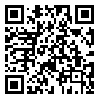Volume 17, Issue 3 (8-2023)
payavard 2023, 17(3): 208-218 |
Back to browse issues page
Ethics code: IR.SKUMS.REC.1399.116
Download citation:
BibTeX | RIS | EndNote | Medlars | ProCite | Reference Manager | RefWorks
Send citation to:



BibTeX | RIS | EndNote | Medlars | ProCite | Reference Manager | RefWorks
Send citation to:
Dehghan Abnavi S, karami Varnamkhasti A, Roshanzadeh M, Kazemi Najafabadi F. Investigating the Effect of Virtual Professional Ethics Training on the Communication Skills of Operating Room Staff. payavard 2023; 17 (3) :208-218
URL: http://payavard.tums.ac.ir/article-1-7364-en.html
URL: http://payavard.tums.ac.ir/article-1-7364-en.html
Samaneh Dehghan Abnavi1 
 , Afshin Karami Varnamkhasti2
, Afshin Karami Varnamkhasti2 
 , Mostafa Roshanzadeh3
, Mostafa Roshanzadeh3 
 , Fatemeh Kazemi Najafabadi *
, Fatemeh Kazemi Najafabadi * 
 4
4

 , Afshin Karami Varnamkhasti2
, Afshin Karami Varnamkhasti2 
 , Mostafa Roshanzadeh3
, Mostafa Roshanzadeh3 
 , Fatemeh Kazemi Najafabadi *
, Fatemeh Kazemi Najafabadi * 
 4
4
1- Instructor, Department of Operating Room, Community-Oriented Nursing Midwifery Research Center, Nursing and Midwifery School, Shahrekord University of Medical Sciences, Shahrekord, Iran
2- Operating room Student, School of Nursing and Midwifery, Shahrekord University of Medical Sciences, Shahrekord, Iran
3- Assistant Professor Department of Operation room, Borojan School of Nursing, Shahrekord University of Medical Sciences, Shahrehkord, Iran
4- Operating room Student, School of Nursing and Midwifery, Shahrekord University of Medical Sciences, Shahrekord, Iran ,fatemekazemi2849@yahoo.com
2- Operating room Student, School of Nursing and Midwifery, Shahrekord University of Medical Sciences, Shahrekord, Iran
3- Assistant Professor Department of Operation room, Borojan School of Nursing, Shahrekord University of Medical Sciences, Shahrehkord, Iran
4- Operating room Student, School of Nursing and Midwifery, Shahrekord University of Medical Sciences, Shahrekord, Iran ,
Abstract: (929 Views)
Background and Aim: Communication skills are considered as the most important feature required for health care workers and provide the basis for the development of professional ethics. Since working in the operating room requires team effort and establishing communication between team members, the importance of communication skills in operating room nurses is more visible. Therefore, in the present study was performed, with the aim of determining the effect of virtual training on the principles of professional ethics on communication skills of operating room staff of Ayatollah Kashani and Hajar hospitals of Shahrekord University of Medical Sciences.
Materials and Methods: A quasi-experimental study with a single-group plan before and after in 2020 was performed on 35 operating room staff of Kashani and Hajar teaching hospitals in Shahrekord who were selected by random sampling. Demographic information questionnaire and Queen Dam communication skills questionnaire were used to collect the data. Data analysis was performed by SPSS software using independent t test, Analysis of variance, paired t-test and ANOVA statistics.
Results: Paired t-test showed that the mean of communication skills after the intervention was significantly different from before (P<0.001). The mean of communication skills before the intervention was 65.85±24.52 and after the intervention was 139.77±5.70. No significant relationship was reported between communication skills and age, service history and number of working hours (P>.0.05). Also, there was no significant difference in the average of communication skills according to the variables of gender, marital status, field of study and degree (P>0.05).
Conclusion: The present study showed that professional ethics training was able to improve the communication skills of employees. Therefore, it seems necessary to compile virtual professional ethics training for health care providers and other groups providing health services who do not have enough time to participate in face-to-face classes. According to the results obtained, managers of health systems are recommended to use strategies such as holding workshops on the principles of professional ethics to develop communication skills in their employees.
Materials and Methods: A quasi-experimental study with a single-group plan before and after in 2020 was performed on 35 operating room staff of Kashani and Hajar teaching hospitals in Shahrekord who were selected by random sampling. Demographic information questionnaire and Queen Dam communication skills questionnaire were used to collect the data. Data analysis was performed by SPSS software using independent t test, Analysis of variance, paired t-test and ANOVA statistics.
Results: Paired t-test showed that the mean of communication skills after the intervention was significantly different from before (P<0.001). The mean of communication skills before the intervention was 65.85±24.52 and after the intervention was 139.77±5.70. No significant relationship was reported between communication skills and age, service history and number of working hours (P>.0.05). Also, there was no significant difference in the average of communication skills according to the variables of gender, marital status, field of study and degree (P>0.05).
Conclusion: The present study showed that professional ethics training was able to improve the communication skills of employees. Therefore, it seems necessary to compile virtual professional ethics training for health care providers and other groups providing health services who do not have enough time to participate in face-to-face classes. According to the results obtained, managers of health systems are recommended to use strategies such as holding workshops on the principles of professional ethics to develop communication skills in their employees.
Send email to the article author
| Rights and permissions | |
 |
This work is licensed under a Creative Commons Attribution-NonCommercial 4.0 International License. |



